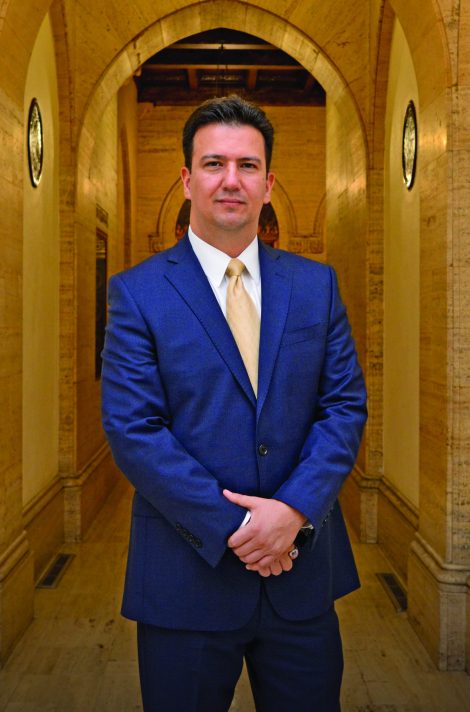In fall 2016, DePaul’s College of Law launched the Third Year in Practice Program, a progressive approach to experiential learning that further prepares students for their first year practicing law. The following spring, the inaugural cohort of 11 students all graduated, passed the bar exam and have found employment - largely because they were ready to jump right into their careers.
When David Rodriguez graduated from law school in 2000, he was ready to practice the profession - or so he thought. Employed in Sidley Austin’s general litigation group, Rodriguez found that his first year working as a lawyer wasn’t exactly easy.
“When I started practicing at Sidley, I was behind the eight ball. It was a taxing year,” Rodriguez recalls. “I ended up doing fine, but it was a lot of late nights, stress and anxiety, and it was primarily because I didn’t know how to do depositions or conduct myself properly and persuasively in court.”
In the United States, the American Bar Association only requires students to take six credit hours of experiential coursework. More and more law firms and organizations, however, expect new hires to be well-prepared and experienced with little supervision or training. According to Rodriguez, it’s common for most law students to struggle during their first year practicing law.
“Attorneys expect you to have a firm grasp of fundamental concepts of litigation. If they ask you to write a motion for summary judgment or a motion to dismiss, you should know how to do it. If they ask you to engage in due diligence or negotiate a contract, they expect you to have a reference point or have experience doing it,” Rodriguez explains.
After Rodriguez began teaching in the College of Law‘s Poverty Law Clinic, now the Civil Litigation Clinic, he became more involved in various experiential learning programs. Rodriguez and other faculty members soon felt the need to create a program that allowed students to put theory into practice, a program that truly prepared them for the early years of their careers.
Launched in fall 2016, the Third Year in Practice program aimed to do exactly that.
 David Rodriguez, senior professional lecturer in the College of Law and faculty director of 3YP, helps law students land on their feet after graduation. (Photo by Tom Evans)
David Rodriguez, senior professional lecturer in the College of Law and faculty director of 3YP, helps law students land on their feet after graduation. (Photo by Tom Evans)
“We followed the medical school model by having students primarily do doctrinal work their first two years and then spend their third year actually practicing law, which would make their transition from student to lawyer a lot smoother,” Rodriguez says.
Based on similar programs in law schools at Washington University in St. Louis and Lee University in Cleveland, Tenn., 3YP students take experiential learning courses that include professional skills, legal drafting or classes in any of the college’s clinics. A large component of 3YP is the intensive externships students participate in during a semester of their third year. Each externship is tailored to the student’s legal interests. Students interested in the program apply during the first semester of their second year to ensure they meet the credit requirements and find an approved field placement.
Eleven students participated in 3YP’s inaugural year. All of them—now DePaul law alumni—are thriving in their careers.
“I can tell you that all of them are going places,” Rodriguez professes. “They had already been going in that direction, but I’d say 3YP is like a booster rocket getting them to space.”
3YP alumni, it turns out, have already landed on the moon.
Becoming a Lawyer
Corinne Cundiff didn’t take a direct route to law school. “It’s something I’ve always wanted to do, but I got married and had five kids. I didn’t think law school was really in the cards for me,” Cundiff reflects.
But Cundiff always pictured herself in a courtroom, so she chased her dream.
When she thought about law schools, the first one that came to mind was DePaul. Cundiff liked the college’s Loop location, but it was 3YP that was especially appealing.
As a mom with a mortgage, Cundiff wanted to be the best candidate when she applied for jobs after law school. She thought 3YP would give her a leg up on the competition. “A big deciding factor for me was 3YP. I realized it would give me the best opportunity to be as practice-ready as I possibly could be,” she says.
In 3YP, Cundiff took several experiential courses, including negotiations and a litigation lab, in which she was able to train with professionals, and did her externship with the United States Attorney’s Office. According to Cundiff , the skills she learned in her externship directly translate to her current role at Pfaff , Gill and Ports. As an associate attorney, Cundiff focuses her practice on personal injury for medical malpractice and products liability, a position she was offered during her 3YP year.
“The most important thing that translated for me was my experience working on a misdemeanor case. My practice is now mostly based in state court, so being able to get a case ready for discovery and trial is the most important skill I learned,” she says.
Cundiff adds that while most law schools limit credit hours for externships and experiential courses, 3YP allowed her to be at her externship every day during the week and take more experiential classes than the average law student.
“The most rewarding thing about 3YP was definitely being able to focus on truly becoming a lawyer in my last year, not just being a student,” Cundiff says. “The market is competitive and if you want a job, just having the grades isn’t going to be good enough. You’re going to need real experience that makes you ready to practice the day that you’re sworn in.”